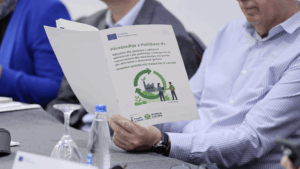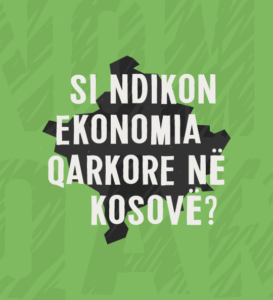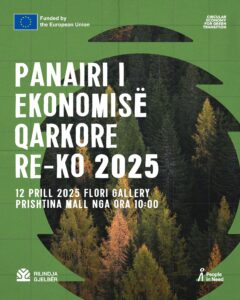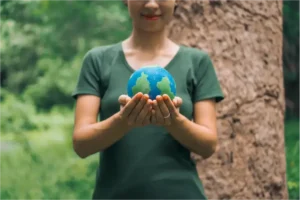Circular Economy – the new global model of doing business!
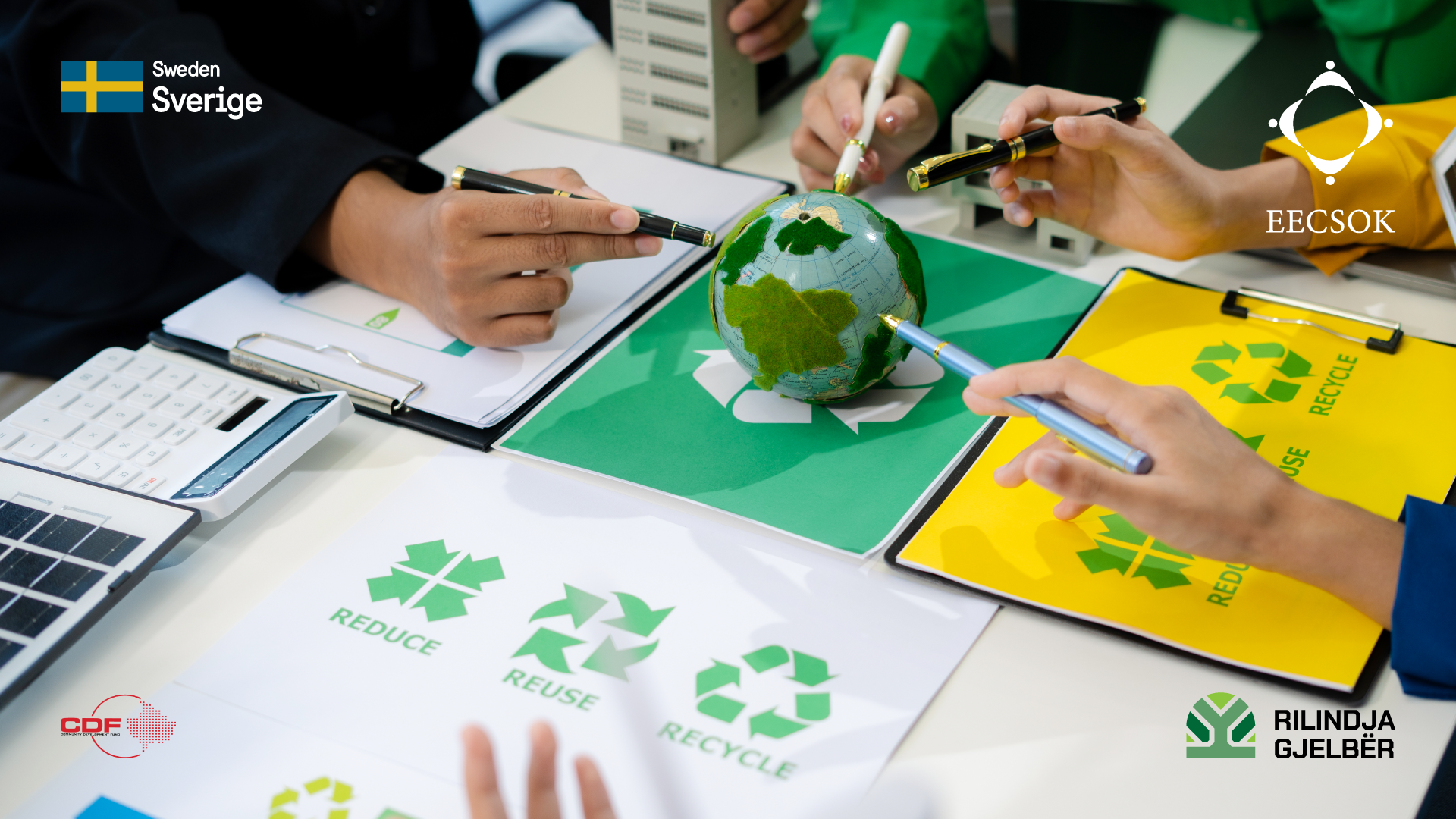
From a Linear Economy to a New Development Model
The world is facing a triple crisis: environmental, economic, and social. The traditional linear economic model—take, make, use, dispose—has proven not only inefficient but also harmful to our planet and societies. In this context, the Circular Economy is emerging as a necessary alternative and a real opportunity to transform how we produce, consume, and recycle.
At its core, the Circular Economy aims to minimize waste and maximize the intelligent and sustainable use of existing resources. It promotes an economy that doesn’t end in waste but circulates, reuses, repairs, and regenerates value from what is often considered trash.
What Are the 3Rs: Reduce, Reuse, Recycle
One of the fundamental principles of the circular economy is the 3R philosophy: Reduce, Reuse, Recycle. This represents a new mindset—not only for consumers but also for businesses and institutions.
-
Reducing unnecessary consumption and overproduction is the first step toward a more efficient, less polluting economy.
-
Reusing materials and products extends their lifecycle.
-
Recycling transforms waste into raw materials for new products, directly contributing to pollution reduction and decreased use of natural resources.
Key Waste Sectors and Their Potential in Kosovo
Paper and Cardboard
According to Kosovo Customs (post-2020), Kosovo exported over 10 million kg of paper and cardboard waste, valued at over €1.3 million.
This shows a strong economic potential if this material is processed locally.
Plastics
A 2022 GIZ report reveals that over 90% of plastic waste in Kosovo ends up in landfills or is incinerated.
Only a small fraction is recycled, mainly by informal private sector businesses.
Aluminum and Metals
Between 2021 and 2023, exports of recycled aluminum exceeded 7.8 million kg, worth over €12 million, according to the Ministry of Industry and Customs.
Kosovo has active scrap collection companies, but lacks a complete local processing chain.
Glass
A 2022 report by People in Need (PIN) shows that only 2% of glass waste is recycled.
Food Waste
According to UNDP Kosovo (2021), an average Kosovar family throws away 30–35% of purchased food.
This represents a real opportunity for composting and organic fertilizer production.
Recommendations from UNDP & Ministry of Environment (Circular Economy Roadmap, 2023)
-
Develop a national data system to monitor resource flows.
-
Establish organized and functional municipal waste collection systems.
-
Implement Extended Producer Responsibility (EPR) and Deposit Refund Schemes (DRS).
-
Align legislation with EU policy, including definitions of waste, by-products, and end-of-waste standards.
-
Use Green Public Procurement (GPP) to stimulate demand for circular products and services.
-
Empower the education sector and integrate circular economy into curricula and educational programs.
-
Leverage technology and digitization to support transparency, traceability, and data on resource circulation.
-
Develop Kosovo’s industrial strategy focusing on green and circular industries.
-
Promote inter-institutional cooperation and public-private partnerships to enable real implementation of the circular economy.
Priority Sectors and Strategies for Circular Economy in Kosovo
According to an analysis by UNDP and the Ministry of Environment, the following seven sectors have the highest potential for circular transformation in Kosovo:
-
Food system
-
Forestry system
-
Manufacturing sector
-
Built environment (construction)
-
Retail sector
-
Creative industries
-
Technology and digitization
These sectors were selected based on their economic impact, resource consumption, and potential for innovation and sustainable transformation.
Data Gaps – A Structural Barrier
Kosovo faces serious data gaps in assessing circular potential, including energy consumption, use of renewable resources, and material flows by sector.
This lack of data limits the ability to design and implement informed and effective policies.
The Need for a National Resource Monitoring System
To meet circular transition objectives, the strategy document recommends creating a national system to monitor resource flows, aligned with international standards.
Such a system would support data-driven decision-making and help prioritize sectors for intervention.
Education as a Cornerstone
The shift toward a circular economy cannot happen without educational transformation.
This includes both horizontal integration of sustainability across all education levels and vertical integration across disciplines.
Education should start from primary schools, include vocational and technical education, and extend to training for businesses and public institutions.
The Role of Technology and the Digital Product Passport
Digitization is essential to the circular economy.
The strategy introduces the concept of a “Digital Product Passport”, which would allow tracking of components and product lifecycles—especially in construction and manufacturing—in line with the EU’s Sustainable Products Initiative.
The Construction Value Chain as a Driver of Transformation
The construction sector contributes over 10% of Kosovo’s GDP and employs more than 50,000 people.
With the implementation of standards for low-emission concrete, recycled materials, and green procurement, this sector can become a model for circular economy transformation in practice.
Funding Opportunities for SMEs
The strategy highlights over €50 million in available funding through:
-
GEFF (Green Economy Financing Facility)
-
EBRD (European Bank for Reconstruction and Development)
-
Green for Growth Fund
-
SME Competitiveness Support Program
-
Women in Business Program
-
TEB Young Entrepreneurs Grant
These funds are designed to support investments in equipment, sustainable technologies, and the reorganization of production processes in line with circular economy principles.
Benefits of the Circular Economy for Kosovo
-
Pollution reduction: Recycled waste doesn’t end up in landfills or get incinerated.
-
Economic development: Processed waste exports have already generated millions of euros.
-
Job creation: The circular economy has created over 700,000 jobs in the EU—a model Kosovo can follow.
-
Alignment with EU objectives: As part of the Western Balkans Green Agenda, Kosovo must align with Green Transition and Circular Economy targets.
A Call to Citizens and Businesses
The circular economy is not just an environmental concept—it’s a strategy for economic and social well-being, always with the planet in mind.
Every citizen can contribute, starting at home—by sorting waste, consuming responsibly, and supporting recycled products.
Businesses have the opportunity to transform their models and offer sustainable, innovative, and competitive solutions in both local and global markets.
Kosovo has extraordinary potential for developing a circular economy. All it takes is a serious institutional approach, collaboration between the private sector and citizens, and an enthusiastic, forward-looking spirit ready for change.
The future is circular!
